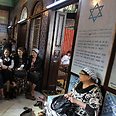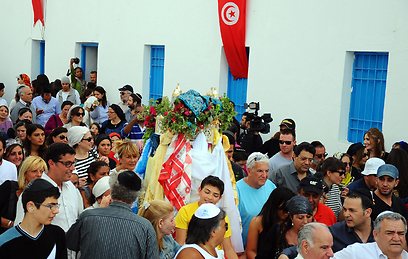
Ghriba synagogue. Djerba, Tunisia
צילום: EPA
Hope, tight security for Tunisia's Jewish pilgrimage
Arab Spring unrest threatens pilgrimage to Africa's oldest synagogue in Tunisia. However, hope, serious security measures facilitate inspiring visit to 2500 year-old place of worship
Pilgrims arrived on Friday at Tunisia's Ghriba synagogue , the oldest in Africa, expressing hope that this year would mark a turning point for the ritual despite a rise in Islamist unrest since the 2011 revolution.
The three-day pilgrimage is taking place amid tight security, with reinforcements deployed around Djerba, the Mediterranean resort island that houses the synagogue.
More than a dozen army trucks were stationed at Ghriba itself, where an Al-Qaeda attack in 2002 killed 21 people, with police checkpoints set up around the nearby Jewish neighborhoods and on the road linking the airport to the tourist zone.
Organizers hope to welcome at least 1,000 pilgrims on Sunday, the main day of the pilgrimage, including some 500 foreigners, among them several dozen Israelis, as well as members of Tunisia's diminished Jewish community.
On Friday, a small crowd of faithful, barefoot and with their heads covered, gathered inside the 2,500-year-old synagogue saying prayers, lighting candles and singing, ahead of a planned procession.
Some sat in the corner reading the Torah, while women dressed in white knelt on the ground where they placed eggs, in a fertility supplication.
"Thank God this year is as it should be, not like in the last two years. I came then, but out of solidarity. There were no real festivities," said Meyer Sabbagh, 63, a real estate developer who left Djerba for Paris after the 1973 Arab-Israeli war.
"There are police this year, it's great. There are a good dozen at the entrance to the Hara (a Jewish neighborhood). My cousin has even come from Israel," said the businessman.
The anticipated number of pilgrims is still far below the 8,000 that came before the 2002 attack, and even the 3,000 that had returned prior to the revolution that toppled former strongman Zine El Abidine Ben Ali in January 2011.
The event was cancelled that year with the country on edge after the mass uprisings, but it resumed discreetly in 2012 and no incidents were reported.
Kamel Essid, an adviser at the religious affairs ministry, said he had come "to show our Jewish brothers that we respect all religions." The Muslim official added that it was the government's "duty" to make every effort to ensure the gathering's success.
Friza Haddad, known as Micha, a Tunisian singer and familiar voice at the annual Ghriba ceremonies, said he wanted to believe there was a future for the pilgrimage, on an island where Jews and Muslims have coexisted harmoniously.
"Here there is no problem, we live as a community. There are Jews here, and Muslims there. But it's only on Djerba that things are like that. In the last two years there have been problems elsewhere" in Tunisia, said the old man.
Islamist militants have staged numerous attacks since Ben Ali fled, most notably on the US embassy in Tunis last September which left four assailants dead.
Michel Zucchero, a Christian doing the pilgrimage with Jewish and Muslim friends, said he was motivated to come by a desire to see Tunisia distance itself from the political, religious and social conflicts that have plagued the country.
For all the hope and the extra security, however, some groups have raised concerns in recent months over an apparent rise in anti-Semitic language in Tunisia.
A minorities support group in March accused the judiciary of failing to prosecute individuals inciting hatred, including Ahmed S'hili, an imam who called openly for a "divine genocide" of the Jews in a sermon late last year.
The Ghriba ritual, which begins 33 days after the start of the Jewish Passover festival, is a central event in the calendar of Tunisia's Jewish community, which has shrunk to around 1,500 members, from 100,000 before independence in 1956.
According to legend, the synagogue was founded in 586 BC by Jews fleeing the destruction of the Temple of Solomon in Jerusalem.











